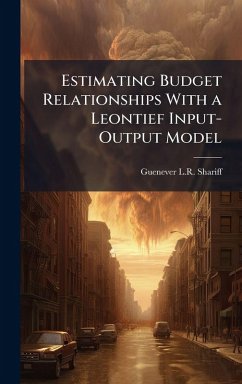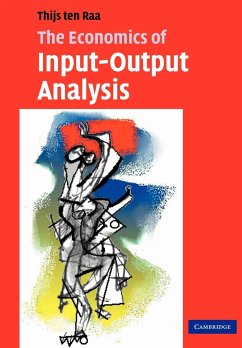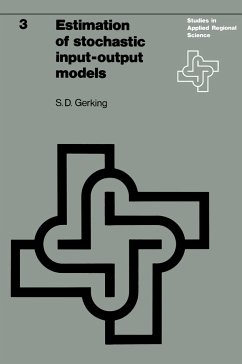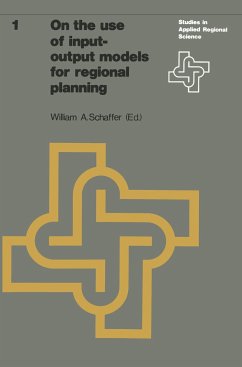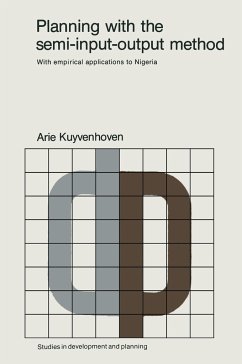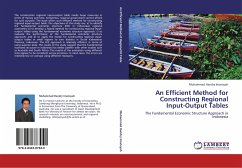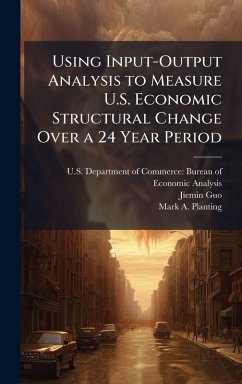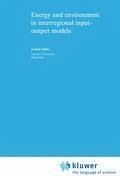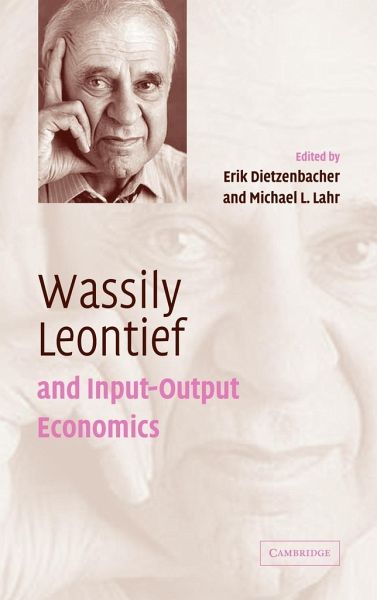
Wassily Leontief and Input-Output Economics
Versandkostenfrei!
Versandfertig in 1-2 Wochen
120,99 €
inkl. MwSt.
Weitere Ausgaben:

PAYBACK Punkte
60 °P sammeln!
A collection of papers in memory of Wassily Leontief, focusing on his contributions to economics.Wassily Leontief (1905-1999) was the founding father of input-output economics, for which he received the Nobel Prize in 1973. This book offers a collection of papers in memory of Leontief by his students and close colleagues. The first part, 'Reflections on Input-Output Economics', focuses upon Leontief as a person and scholar as well as his personal contributions to economics. It includes contributions by Nobel Laureate Paul A. Samuelson who shares his memories of a young Professor Leontief at Ha...
A collection of papers in memory of Wassily Leontief, focusing on his contributions to economics.
Wassily Leontief (1905-1999) was the founding father of input-output economics, for which he received the Nobel Prize in 1973. This book offers a collection of papers in memory of Leontief by his students and close colleagues. The first part, 'Reflections on Input-Output Economics', focuses upon Leontief as a person and scholar as well as his personal contributions to economics. It includes contributions by Nobel Laureate Paul A. Samuelson who shares his memories of a young Professor Leontief at Harvard and ends with the last joint interview with Wassily and his wife, to date previously unpublished. The second part, 'Perspectives of Input-Output Economics', includes new theoretical and empirical research inspired by Leontief's work and offers a wide-ranging sample of the current state of interindustry economics, a field Leontief founded. This is a strong collection likely to appeal to a wide range of professionals in universities, government, industry and international organizations.
Table of content:
Part 1. Reflections on Input-Output Economics: 1. A portrait of the master as a young man Paul A. Samuelson; 2. Leontief's 'Magnificent Machine' and other contributions to applied economics Karen R. Polenske; 3. International trade: evolution in the thought and analysis of Wassily Leontief Faye Duchin; 4. Leontief and the future of the world economy Emilio Fontela; 5. Leontief's input-output table and the French development plan Henri Aujac; 6. Experiences with input-output and isomorphic analytical tools in spatial economics Jean H. P. Paelinck; 7. Leontief and dynamic regional models William H. Miernyk; 8. Leontief and Schumpeter: a joint heritage with surprises Andrew Brody and Anne P. Carter; 9. Some highlights in the life of Wassily Leontief - an interview with Estelle and Wassily Leontief Christian deBresson; Part II. Perspectives of Input-Output Economics: 10. A neoclassical analysis of TFP using input-output prices Thijs ten Raa; 11. What has happened to the Leontief paradox? Edward N. Wolff; 12. The decline in labor compensation's share of GDP: a structural decomposition analysis for the US, 1982-1997 Erik Dietzenbacher, Michael L. Lahr and Bart Los; 13. An oligopoly model in a Leontief framework Robert E. Kuenne; 14. Economies of plant-scale and structural change Iwao Ozaki; 15. Technological change and capital accumulation in Japan Masahiro Kuroda and Koji Nomura; 16. Japan's economic growth and policy making in the context of input-output models Shuntaro Shishido; 17. Contributions of input-output analysis to the understanding of technological change: the information sector in the United States Lawrence R. Klein, Vijaya Duggal and Cynthia Saltzman; 18. Can investment change trade patterns? An application of dynamic input-output models linked by international trade to an Italian policy question Clopper Almon and Maurizio Grassini; 19. Social cost in the Leontief framework: conceptual foundation of allocation and pricing Albert E. Steenge.
Wassily Leontief (1905-1999) was the founding father of input-output economics, for which he received the Nobel Prize in 1973. This book offers a collection of papers in memory of Leontief by his students and close colleagues. The first part, 'Reflections on Input-Output Economics', focuses upon Leontief as a person and scholar as well as his personal contributions to economics. It includes contributions by Nobel Laureate Paul A. Samuelson who shares his memories of a young Professor Leontief at Harvard and ends with the last joint interview with Wassily and his wife, to date previously unpublished. The second part, 'Perspectives of Input-Output Economics', includes new theoretical and empirical research inspired by Leontief's work and offers a wide-ranging sample of the current state of interindustry economics, a field Leontief founded. This is a strong collection likely to appeal to a wide range of professionals in universities, government, industry and international organizations.
Table of content:
Part 1. Reflections on Input-Output Economics: 1. A portrait of the master as a young man Paul A. Samuelson; 2. Leontief's 'Magnificent Machine' and other contributions to applied economics Karen R. Polenske; 3. International trade: evolution in the thought and analysis of Wassily Leontief Faye Duchin; 4. Leontief and the future of the world economy Emilio Fontela; 5. Leontief's input-output table and the French development plan Henri Aujac; 6. Experiences with input-output and isomorphic analytical tools in spatial economics Jean H. P. Paelinck; 7. Leontief and dynamic regional models William H. Miernyk; 8. Leontief and Schumpeter: a joint heritage with surprises Andrew Brody and Anne P. Carter; 9. Some highlights in the life of Wassily Leontief - an interview with Estelle and Wassily Leontief Christian deBresson; Part II. Perspectives of Input-Output Economics: 10. A neoclassical analysis of TFP using input-output prices Thijs ten Raa; 11. What has happened to the Leontief paradox? Edward N. Wolff; 12. The decline in labor compensation's share of GDP: a structural decomposition analysis for the US, 1982-1997 Erik Dietzenbacher, Michael L. Lahr and Bart Los; 13. An oligopoly model in a Leontief framework Robert E. Kuenne; 14. Economies of plant-scale and structural change Iwao Ozaki; 15. Technological change and capital accumulation in Japan Masahiro Kuroda and Koji Nomura; 16. Japan's economic growth and policy making in the context of input-output models Shuntaro Shishido; 17. Contributions of input-output analysis to the understanding of technological change: the information sector in the United States Lawrence R. Klein, Vijaya Duggal and Cynthia Saltzman; 18. Can investment change trade patterns? An application of dynamic input-output models linked by international trade to an Italian policy question Clopper Almon and Maurizio Grassini; 19. Social cost in the Leontief framework: conceptual foundation of allocation and pricing Albert E. Steenge.





